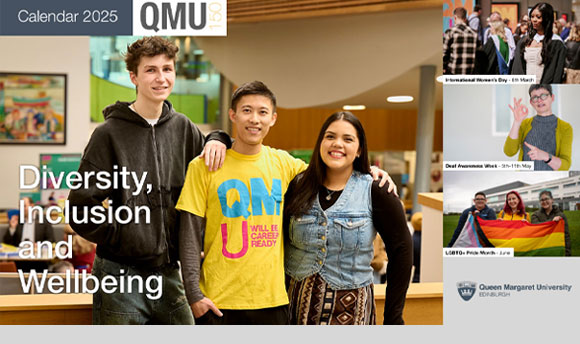Athena Swan at QMU
Queen Margaret University is a proud member of the Athena Swan Charter and currently holds an institutional Athena Swan Bronze award for its continued commitment to advancing gender equality. Under the Athena Swan Charter framework, QMU is part of a global community with a shared goal of embedding inclusive cultures in higher education and research.

The Athena Swan Charter recognises good practice in promoting gender equality in higher education. Originally established to support women’s careers in science, technology, engineering, maths and medicine, the Charter now champions equality across all disciplines, and seeks to address the inclusion of students, professional staff, trans people and the underrepresentation of men where appropriate.
In 2025, the University was successful in renewing its institutional Athena Swan Bronze award. This accreditation, conferred in February 2025, endorses the University’s continued dedication to fostering gender parity through the Athena Swan Charter. The rigorous self-assessment process, undertaken as part of the application for the award, has also helped the University to identify institutional challenges, which have informed six new gender equality priorities for the University to address over a 5-year action plan.
Read our successful Institutional Bronze Renewal Application
The Athena Swan Charter is a framework which is used across the globe to support and transform gender equality within higher education (HE) and research. The Athena Swan Charter:
- helps institutions achieve their gender equality objectives
- assists institutions to meet equality legislation requirements, as well as the requirements and expectations of some funders and research councils
- uses a targeted self-assessment framework to support applicants identify areas for positive action as well as recognise and share good practice
- supports the promotion of inclusive working practices that can increase the retention of valued academics and professional and support staff, demonstrating an institution’s commitment to an equitable working environment
The Charter is managed by AdvanceHE. Further information can be found on the AdvanceHE website.
Queen Margaret University is committed to the Athena Swan principles. In achieving Bronze Status under the charter, we commit to:
- adopting robust, transparent and accountable processes for gender equality work, including:
- embedding diversity, equity and inclusion in our culture, decision-making and partnerships, and holding ourselves and others in our institution/institute/department accountable.
- undertaking evidence-based, transparent self-assessment processes to direct our priorities and interventions for gender equality, and evaluating our progress to inform our continuous development.
- ensuring that gender equality work is distributed appropriately, is recognised and properly rewarded.
- addressing structural inequalities and social injustices that manifest as differential experiences and outcomes for staff and students.
- tackling behaviours and cultures that detract from the safety and collegiality of our work and study environments, including not tolerating gender-based violence, discrimination, bullying, harassment or exploitation.
- understanding and addressing intersectional inequalities.
- recognising that individuals can determine their own gender identity, and tackling the specific issues faced by trans and non-binary people.
- examining gendered occupational segregation, and elevating the status, voice and career opportunities of any identified under-valued and at-risk groups.
- mitigating the gendered impact of caring responsibilities and career breaks, and supporting flexibility and the maintenance of a healthy ‘whole life balance’.
- mitigating the gendered impact of short-term and casual contracts for staff seeking sustainable careers
Queen Margaret University was first awarded an institutional Athena Swan Bronze Award in April 2013, which was successfully renewed in 2017. The University has also previously achieved 2 Bronze divisional awards in the Division of Dietetics, Nutrition, Biological Sciences, Physiotherapy, Podiatry and Radiography in 2015, and the Division of Nursing in 2017.
In 2020, the UK Athena Swan Charter went through a transformation based on recommendations from an Independent Review and consultation with the sector, including through its Athena Swan Governance Committee. The transformed charter introduced a number of changes to the Athena Swan framework, including an update to the commitments that underpin Athena Swan and set out shared goals for gender equality that all participants agree to support. The University's 2025 Award marks QMU’s first application under the updated framework.




